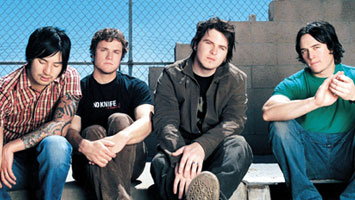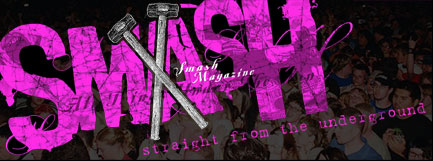
In
my humble opinion, and I’m sure there are numerous others,
it all culminated with the bidding war for Jimmy Eat
World’s “Bleed American” record. The past two, maybe
three decades worth of “indie-rock” including the early
days of punk, hardcore, emo, and included hybrids had
finally developed a broad enough fanbase to peak the
attention of major labels. A new music revolution of
sorts was taking place not unlike the commercial development
of “Alternative” rock in the late eighties. I say revolution
because revolutions must be financed, and that’s just
what the majors intended to do. The early days were
the creation, but this had become the division which
lead to the war. The past three or four years have tested
the so called “punk rock ethics” of many bands and caught
others in the crossfire by mere association. From the
consummate DIY-ers Rancid and their signing to Warner
Brothers, to what has been called the “Warped Tour”
signing frenzy of peripheral bands, the boun daries
of independence are being tested on a daily basis. Surely
some would suggest that the DIY spirit has long been
abandoned. Whatever your thoughts on the matter may
be, whatever your feelings are on the bands that have
come to this fork in the road, Smash Mag had the opportunity
to speak with two bands that have been at the top of
such discussions over the past year. I sat down with
members of each to see how the bands are finding transition,
why they’re moving to majors, and perhaps most importantly,
what their impressions of fan reactions have been.
Interview one: The artists and the ambience.
Nothing new to most of you, Thrice has been in existence since 1998. Originally working with a friend on Green Flag records in their hometown of Tustin, CA, the band made the move to the more established Sub City and most recently made their major label debut on Island/Def Jam with 2003’s “Artist in the Ambulance.” With a core fan base already in place, it’s been interesting to watch as more fans fall into the mix through avenues that include radio airplay, promotional performances like the recent opening of an Apple computer store, and MTV airplay. As a band rooted in their beliefs and artists that take their integrity very seriously, it was my interest to see how the band was taking some of their new found fame. Smash spent some time on the bus with Thrice bassist Eddie Breckenridge to find out about the band, the fans, ties to Vegas, and even a little lesson on sharing.
SM: You’re a band that’s known for its integrity.
You check a lot of the different stuff that goes on.
Having built such a fanbase for yourselves, even before
you signed to an indie label, versus now, being on a
major (Island/Def Jam), and seeing more fans added to
the mix through radio, MTV and other outlets, am I to
assume that you guys are happy with as many fans as
want to hear your music?
T: I think even before we had the MTV fans and stuff, there were still some kids that I... don’t necessarily agree with their reasons for liking certain things about us or whatever. Like if you hear a kid be like, “Yeah dude, I listen to your music and I just wanna like...fight” or something like that. You’re like, “dude, what is your problem?” (laughs) I think that a lot of our lyrics and the message we put across are positive and I would hope that the people that listen to our music would be affected that way.
SM: How would you want people to respond to your
music?
T: Like in a live setting? I love it when people just sing along. I mean, that’s what I do; sing along, have fun, and dance. But when people are violent towards each other, it’s making something that I would like to be positive...negative. I don’t want anyone hurt at our shows and I want it to be a community of a bunch of friends or if they’re not friends they can meet friends. I just think music is an awesome way to bring people together. Especially if you’re passionate about the band that you like. It’s a medium that doesn’t have to be...clique-y. I think that people can come to our shows and hang out with people, have fun and not feel like they have to act a certain way or be a certain type of person and just have fun and enjoy music. That might sound pretty broad but I think it’s the most important thing.
1 2 3 next >
